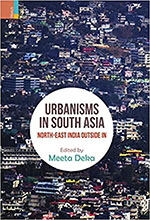Emerging scholarship on urban studies in South Asia poses a critique of the application of Eurocentric models to capture urban processes in the global South. South Asian scholars, while arguing that urbanization is not uniform, argue for a contextual understanding of urban shifts. In addition to examining urban patterns concerning colonial history, and the roles of the state and the market, studies on urban processes also bring under their purview other categories such as gender, caste, kinship, ethnicity and culture. Drawing from a range of perspectives, urban processes in South Asia are now being explored through interdisciplinary, comparative, and contextual approaches. In this context, the edited volume by Meeta Deka offers a significant contribution to the field of Urban Studies in South Asia.
With a primary focus on urbanization in the North East regions of India in the early modern and modern period, this volume delves into five themes concerning urban life with comparative and transnational perspectives. It includes ecology and urbanization, trade and towns, urban demography, urban morphologies and urban cultures. Moving beyond a western narrative of urbanization as essentially emerged through Capitalism and industrialization and a linear model of social change from a traditional to modern society, Meeta Deka contends that cities and urban centres existed in India even in the medieval period and as early as in 2300 BCE.

